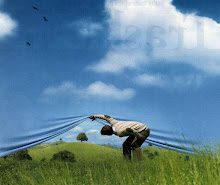\tair-uh-DID-uhl\, noun:
1. A petty falsehood; a fib.
2. Pretentious nonsense.
~~~~~~~
Humans are disposed toward objectifying, I think, because if we were to ponder the meaning of each thing we encounter, we would scarcely be able to move. Certainly this notion does not do much justice to our intellectual capacity, but at certain times and places, objects are made out of things that might, on a certain day and with a certain amount of thought, be meaningful. Why?
Because we are the makers of meaning. Perhaps there are two types of objects—those that are as such because of their non-interaction with our intellect, which would place upon them an understanding after asking for some kind of explanation, and then the second type, the one where things become objects for our necessity/enjoyment. The latter is peculiar, in that certain subjects are made objects specifically because of our focus, rather than our ignorance of them. The distinction between involves what meaning we give to that object and the role it fulfills in our satiation.
Acting this way toward one another is inevitable, I think, but not necessarily right. Particularly where humans, similarly self-cognizant intermediaries of thought and action are concerned, it is difficult not to accidentally let this particular objectification for the purpose of our satiation—as we might do with food, the sun, forms of recreation, etc., spill over into the realm of other creatures. It fact, it’s to be expected.
As instinctual and biological creatures, there are some drives that require function beyond what the intellect may demand of the creature in order to stay alive and propagate. This sort of instinct drives sex as well, and tends to (regarding pornography or not) derive objects from subjects due to sexual desires to overrule any intellectual dispositions that might stray from potential propagation.
But we are made best in a thoughtful capacity, I think, which is why I’m undecided on the issue of the morality of pornography. I don’t think I can say with certainty that acting hedonistically is wrong, but when it involves making an object of a sentient creature, it gets hazy. I disagree with zoos but not the mentioned safaris, particularly because, despite what curiosities may be being satiated on our accounts, we are not harming the creatures in pursuit of our enjoyment. So perhaps the biggest problem with pornography is not merely the objectification, but the exploitation (on the part of those being harmed in the creation of pornography), more distinctly?
I only wonder about whether or not objectification is wrong if it causes the subject being objectified no harm. Certainly Kant would say that this might indirectly lead to an inappropriate approach to interaction with subjects later on down the road, and I would agree with him in some cases, as one step in the wrong direction encourages more. But I’m still ambivalent as to whether or not objectification of sentient things is always, under normal circumstances, wrong.

3 comments:
Objectification seems inevitable, but we can still treat the object with respect... We don't think about it. In our society we have come to expect to be entertained regardless of inconvienience to others.
I agree. A level of respect must always be maintained, even with things objectified. I think we can approach the world with a certain amount of compassion no matter what's in front of us, animate or not.
That's why Kant cautioned against ever treating an agent as *merely* a means.
Post a Comment